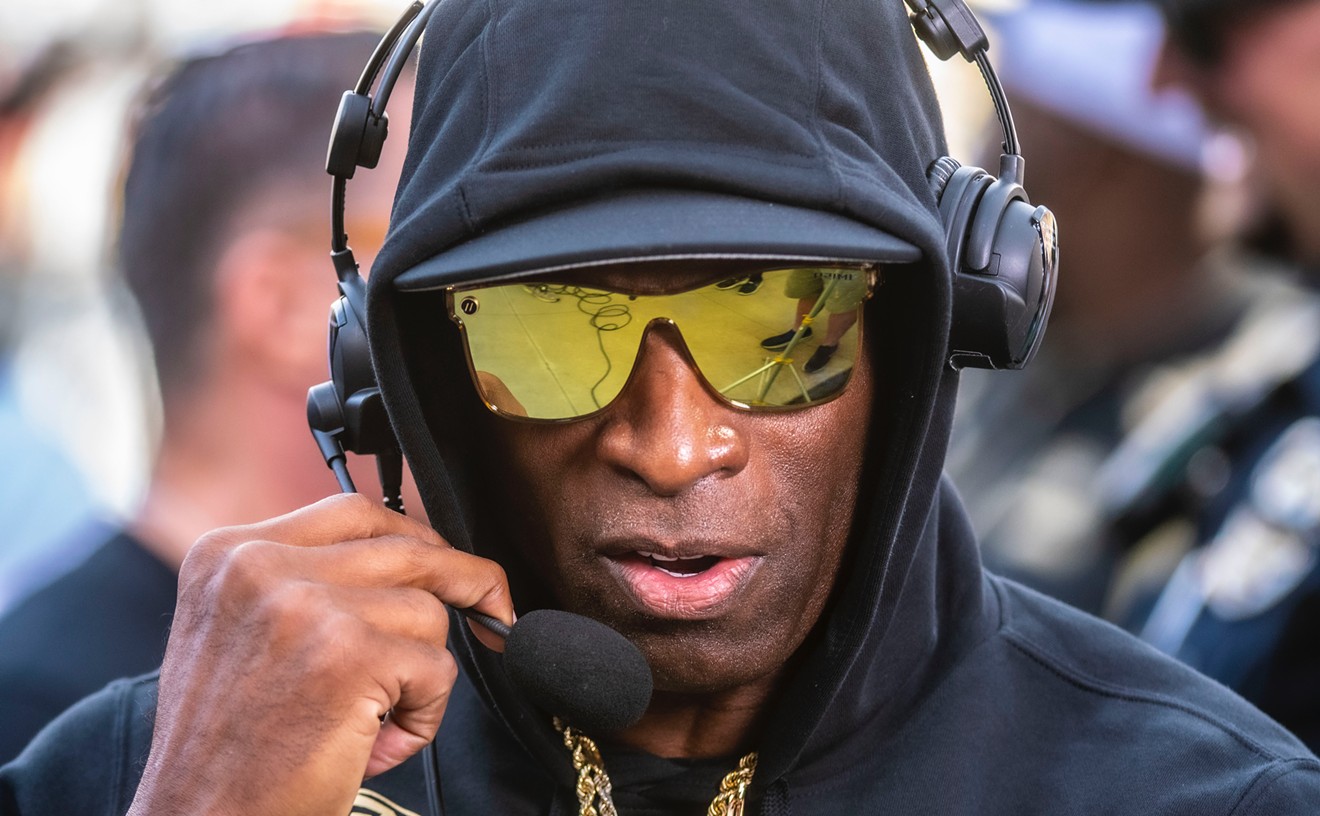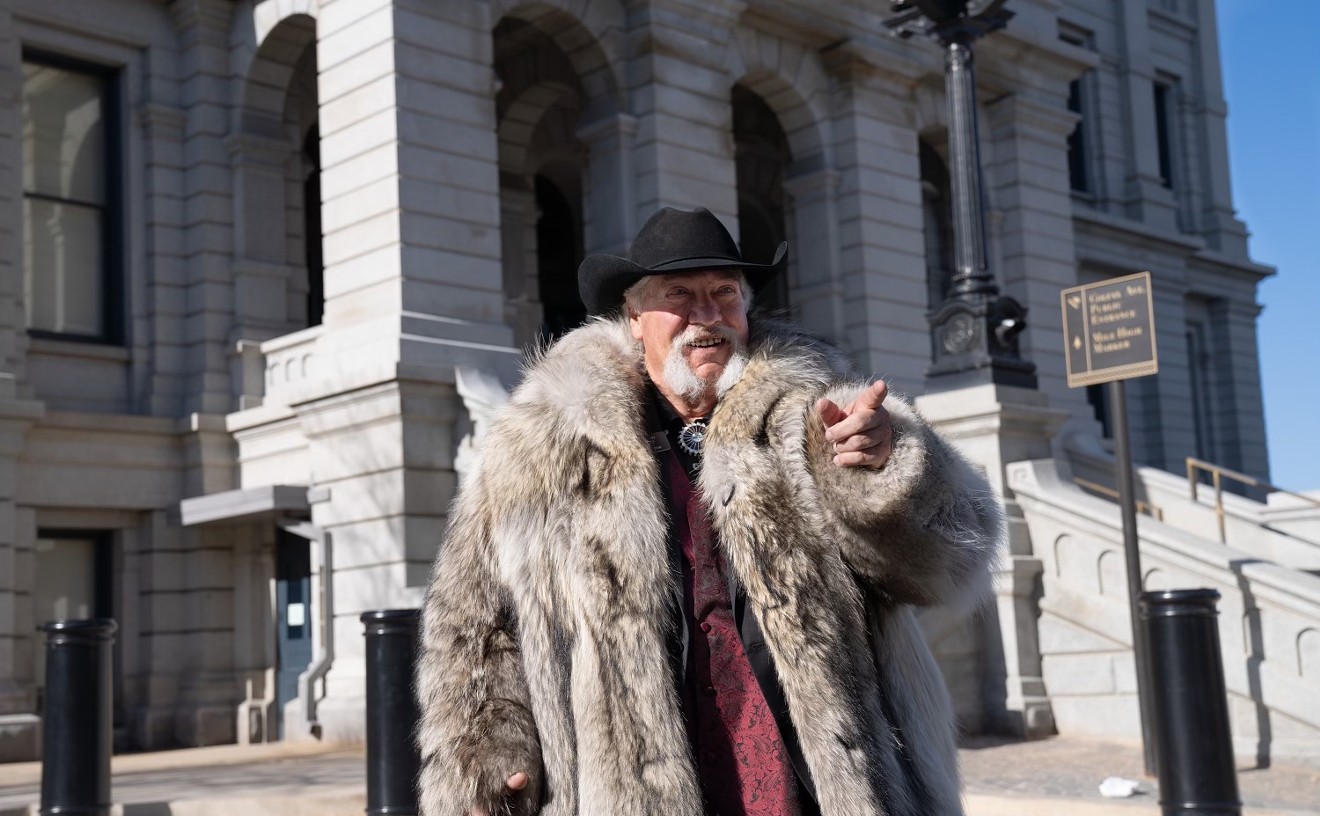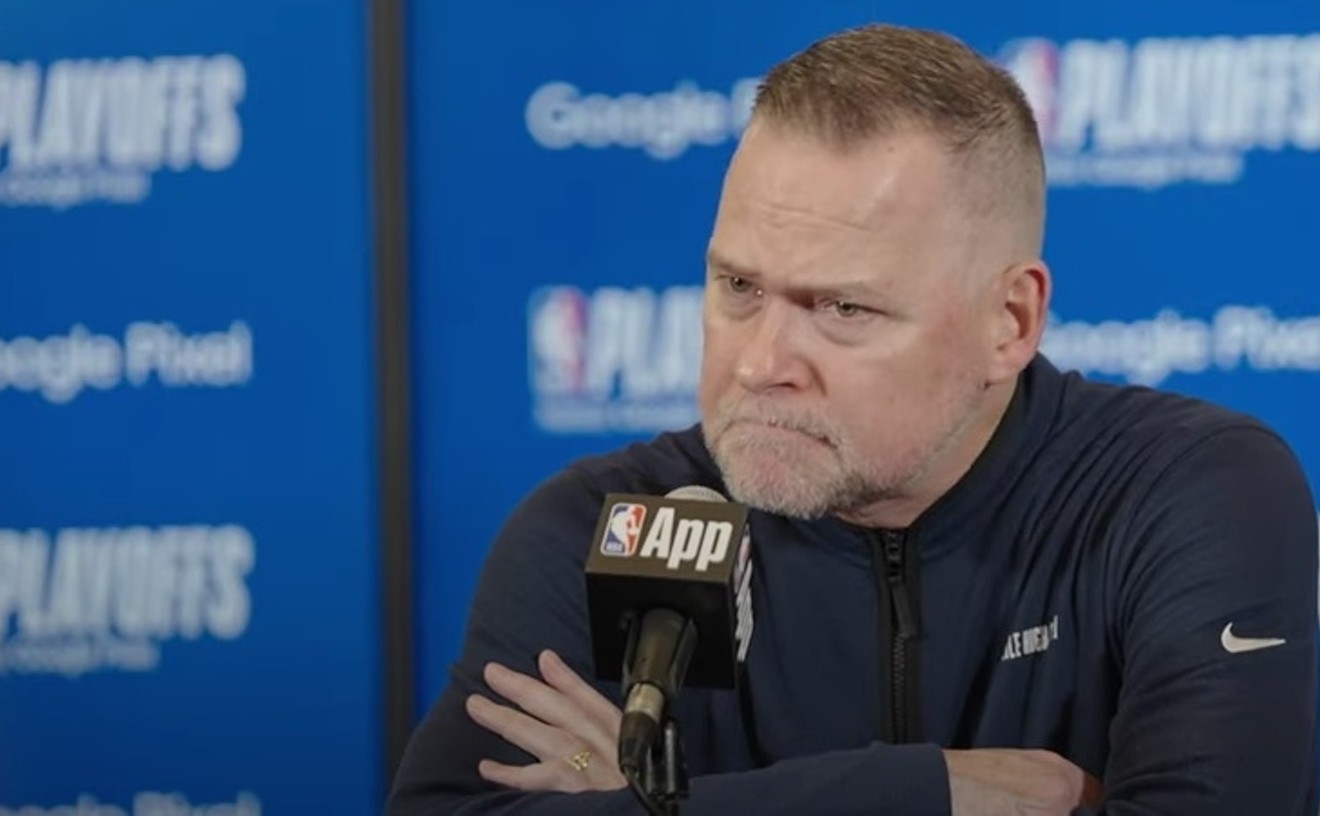Which is precisely the point. Just short of a year into the reign of editor Greg Moore, the onetime managing editor for the Boston Globe who was charged by owner Dean Singleton with turning the Post into one of the finest newspapers in the U.S. of A., the publication remains damnably inconsistent. Entire days sometimes go by between issues that are above average, let alone outstanding, and plenty of reports during these spans suffer from conceptual flabbiness, tedious writing and erratic presentation. As a result, those occasions when everything comes together stand out in ways they wouldn't if Dean's desire for excellence materialized with more regularity.
At the same time, it's clear that Moore is making loads of bold personnel decisions. Some of the new recruits have a history in the market, such as incoming assistant business editor Dana Coffield, who left the Rocky Mountain News in favor of a high-paying position at Interactive Week ("Show Them the Money," November 16, 2000) only to have the magazine fold beneath her feet when the tech boom went kerplunk. However, three of the most intriguing new Posters -- film critic Lisa Kennedy, Washington bureau chief John Aloysius Farrell and metro columnist Cindy Rodriguez -- either have antiquated ties to the community or none at all.
Of course, Kennedy, Farrell and Rodriguez also have the potential to get the Post moving in the right direction. Whether they'll be able to do so when the Moore hires who've preceded them are still struggling to get the paper out of first gear is another matter entirely.
Kennedy was born in Boston but moved to Denver at age six with her family; she graduated from East High School. From there, she headed to Yale University and subsequently made her journalistic reputation while working for major print outlets based in larger media centers. She served in an editorial capacity for national magazines such as Out and Us, and played a variety of roles at the Village Voice in New York City. More recently, she lived in Phoenix, where she freelanced for the L.A. Weekly and Phoenix New Times, one of Westword's sister publications.
Stylistically, Kennedy's published film reviews bear the mark of the alternative weeklies where she's spent so much of her career. They're long, smart and discursive, avoiding the type of rote structure and gee-whiz language that many readers associate with movie writing in daily newspapers. As such, her arrival may be an exciting development for Denver cineastes -- if, that is, she'll be allowed to stretch out in ways that would be new for the Post. Kennedy, who also writes a bi-weekly column called "The Spin" for NiaOnline.com, a Web site targeted at African-American women, has gotten good vibes thus far.
"They've seen my clips, and they know what kind of thinker I am," she notes. "And they seem excited for me to bring intelligence and a freer style to daily film criticism. Everyone keeps encouraging me to not feel that I have to write down to readers, and I don't think I'll have to. It's amazing to me how much viewers know about film and how many of them say things that point to their grasp of film language."
At the same time, Kennedy, who officially joined the Post last week, doesn't want to come across as an elitist who'll slag everything except art-house exegeses and four-hour documentaries about leprosy: "I tended to be the populist at the alternative publications I worked at when it came to film. I'm a movie enthusiast." About review length, she says she hasn't been given specific restrictions, but she understands that expectations may be different. "I've been interested in trying to learn to write tighter and leaner -- and I've been noticing that paragraphs in newspapers can be really short." She laughs. "I'm like, 'A two-sentence paragraph! I've never noticed that before!'"
Those who remember Farrell from his first stint at the Post don't associate him with brevity, either. He toiled at the paper during the first half of the '80s, when it was owned by the Times Mirror Company, and he was known primarily for a pair of eight-part series: "Utah: The Church State," a peek behind the Mormon church's so-called "Zion curtain," and "The New Indian Wars," about Indian resource issues. Still, he's proudest of an investigation of faulty anesthesia machines that started at Rose Medical Center and eventually led to the nationwide recall of the devices and new federal regulations that require manufacturers to report flaws. For it, Farrell won the George Polk Award, a prize nearly as coveted as the Pulitzer.
Shortly thereafter, Farrell headed to the Boston Globe, where he eventually became deputy chief of the paper's Washington bureau; he also won plaudits for writing 2001's Tip O'Neill and the Democratic Century, a biography of Tip O'Neill, longtime Speaker of the House. Nonetheless, these credentials didn't win him the Washington bureau chief job recently vacated by David Shribman, who is now executive editor of the Pittsburgh Post-Gazette. Farrell applied, but the gig went to Peter Canellos, who suffered a tragedy last week when his longtime companion, Globe reporter Elizabeth Neuffer, died in a car accident while covering events in Iraq.
When it became clear that Farrell wouldn't be promoted to bureau chief at the Globe, he began looking around, and discovered that the Denver Post was searching for someone to replace Washington-based Bill McAllister, who had retired. Since Farrell knew Moore from their days at the Globe, he called the Post's editor and inquired about the opening. Things moved quickly from there. "I had several deal-breakers in the back of my mind," Farrell concedes, "so the only talking Greg had to do was to say 'Yes,' 'Yes' and 'Yes,' which he did -- and then I didn't have a reason not to do it."
Farrell's history at the Post might have presented one last obstacle. After all, Times Mirror had poured money into the paper in an attempt to put it on the national journalism map, but when revenues didn't increase with sufficient speed, the firm backed off, eventually selling to Singleton. The same thing could happen again a few years from now, but "as I told Greg, I'm a sucker for a dream," Farrell says. Moore's allowing Farrell, who started on May 12, to expand the Post's Washington bureau to four staffers, with incremental increases likely in the coming years. To Farrell, the opportunity to build a bureau from the ground up was irresistible: "It's not often in this business that you get such a fresh opportunity to begin anew, and when it happens, you get the feeling that the grownups have left you alone in the bakery."
Like Farrell, Rodriguez comes to the Post from the Globe, where she did a consistently fine job of reporting about urban affairs and immigration in addition to covering breaking news like the Rhode Island nightclub fire in February that killed a hundred fans of the hard-rock band Great White. Prior to joining the Globe, she served as an occasional columnist at the Syracuse Post-Standard, and she's eager to take on the challenge again. She plans to write for what she refers to as "'my community,' which isn't just the Latino community. It's the little man or little woman who's pushed around, and people who don't have a voice in government or a say in the grand scheme -- the elderly, children."
In many ways, Rodriguez's task is tougher than those facing Kennedy and Farrell, because she's following Tina Griego, who left the Post last year for the Rocky. Griego is beloved among area Hispanics; all of the Latino leaders and activists interviewed for "Diverse Opinions," last week's column about a program sponsored by the National Association of Hispanic Journalists, made a point of lauding her. For that reason, Rodriguez will be under immediate pressure not only to measure up, but to focus entirely on Hispanic stories -- something she's reluctant to do. "The only person who could pigeonhole me is myself," she says, "and I don't intend to do that." Furthermore, Rodriguez had only visited Denver briefly before signing on with the Post, where she'll set up housekeeping on May 27. She's confident that her lack of time in Colorado won't be a disadvantage. "I think it's going to be great for Denver to have a new voice in the paper -- someone coming in with a fresh perspective."
Moore agrees. He calls Rodriguez "a terrific journalist who'll be a very powerful and interesting addition to the paper," and he's equally positive about Farrell ("a very experienced hand in Washington who understands this paper, its interests and the region") and Kennedy ("a real talent with a great background, and we're lucky as hell to get her").
All of Moore's opinions are entirely defensible. Now what's left is for this triumvirate to transform the promise to prose that gives readers their money's worth. Day in and day out.
Critique speak: "Post Has Questionable Obit Priorities," the May 3 offering from bi-weekly Rocky Mountain News media columnists Diane Eicher and Joe Bullard, found fault with a pair of long-form obituaries that appeared in the Denver Post -- a February effort about the death of the Breckenridge "town drunk" and an April wrap-up concerning an intoxicated man killed by police. "We would argue there are simply some people who don't warrant their fifteen minutes of fame -- or their fifteen inches of space," Eicher and Bullard stated.
What didn't turn up in the column was any mention of Claire Martin, the reporter who penned the obits in question. The closest Eicher and Bullard came was printing a Martin quote, sans name, that originally appeared in an obituary-related piece written by yours truly ("Dead Lines," April 18, 2002). Martin was miffed enough to send a letter of complaint to the Rocky expressing disappointment that the columnists "neglected to call and ask why I chose to write about the specific articles they singled out as an example of wasted newspaper space. Certainly they -- my former co-workers -- were well aware that I wrote all of the obituaries they mentioned."
This last remark echoes grumbling that's sounded intermittently since last year, when Eicher and Bullard took over the Rocky media column from Greg Dobbs, who gave it up after becoming the morning host for KNRC-AM. (The Independence Institute's Dave Kopel, who was originally paired with Dobbs, continues to write twice a month.) Eicher reported at the Post for more than two decades, and Bullard, her husband, was a managing editor during the Times Mirror era, yet many observers perceived them to be strongly anti-Post, particularly during their first six months on the beat.
Even Dobbs held this view, which he shared in a January 5 letter to the Rocky charging that the writers' "disproportionate focus on perceived errors of fact, omission or judgment at the Post" caused him to wonder if they'd "abandoned the spirit in which the column was envisioned." In a portion of Dobbs's missive the News chose to exclude, he went further, asking, "Do they have a grudge against the Post? Well, Bullard was fired, and although he recently wrote to me that Eicher 'has no axe to grind,' three different longtime Post staffers agreed that Eicher's departure was 'bitter.' Draw your own conclusions."
In separate interviews with Westword in January, Bullard -- who runs a Wheat Ridge business called Publication Design Inc. that has worked with the News on three sports-related books -- and Eicher, now pursuing a teaching career, scoffed at the notion that they're knee-jerk Post bashers. "I left of my own accord and on my own terms," said Eicher, who sometimes wrote about media subjects in her capacity as a Post feature writer. "I'd been there for 23 years, and I was writing the same stories. I wanted to do something else." As for Bullard, he stressed that he was removed from his position as managing editor of the Post a long time ago -- 1988, in fact. Moreover, Bullard was canned by Post columnist and controversy lightning rod Chuck Green, yet he and Eicher wrote in an October 2002 column that Green's arrest for driving under the influence after he left the paper last year didn't deserve to be reported. "He wasn't a public figure anymore," Bullard said.
Even so, the perception that Eicher and Bullard had a jones for the Post remained in the air during the first couple months of the year. When editor Greg Moore was asked at the time if he considered their work to be slanted against the Post, he said, "I do. And I don't like seeing it in my paper."
Indeed, Eicher and Bullard's columns ran on the sole Rocky page in the Sunday Post until March, when the media section was transferred to the Saturday News. Speculation arose that the change was made because the writers' bias against the Post made Sunday placement awkward, but Rocky editor/president/publisher John Temple said other considerations prompted the shift. "I think the media columns are a strong part of the Rocky that gets muddied in the context of the Denver Post," he said at the time. "When you're on an editorial page that's on page eleven of a twelve-page section that's buried inside a second A section and inside all those ads, it's very difficult to find and hard to have the impact you want to have." Temple is now using the News's Sunday page to try and lure Post readers to his paper with exclusive syndicated fare, including cartoons by the Washington Post's Tom Toles.
Regarding the accusation that Eicher and Bullard lack objectivity about the Post, Temple said, "They aren't very popular in either newsroom. Journalists generally have pretty thin skins; they don't like being attacked. And I can tell you there are editors at my newspaper who really bristle at what we allow the critics to say and believe them to be poorly informed, misinformed, ignorant." Dobbs, meanwhile, believes Eicher and Bullard are now doing a better job of looking for gaffes in both papers, rather than focusing too much of their energy on only one.
None of that makes Martin any happier that neither Eicher nor Bullard bothered to call her, or even identify her, before drubbing the obits she authored. Afterward, "Diane wrote me a very long e-mail in defense," Martin noted in an e-mail of her own, "although her response seemed, to me, to miss the point I was trying to make."
Eicher also sent Westword an e-mail on this topic. In it, she writes that she and Bullard left Martin's name out because their editors have asked them to avoid personalizing matters. "It's true that at times we have used the names of specific reporters, but in this case we felt there was no real point," she states. What's more, Eicher feels that their charge "is not to serve as ombudsmen or to explain to readers why reporters did something a certain way; our job is to critique and offer opinion." Contacting Martin would have served no purpose, she believes, "because any explanation she might have offered really wouldn't have changed our opinion."
Probably not -- but it would have offered readers more information to use when making their own judgments. A critic might call the result an example of good journalism.











